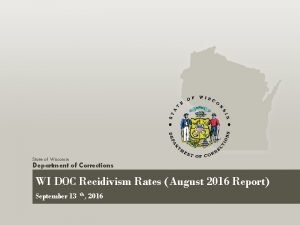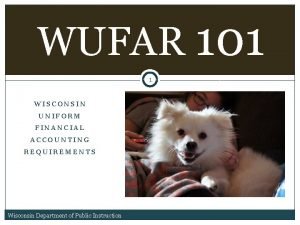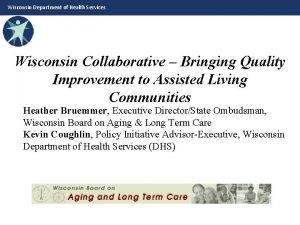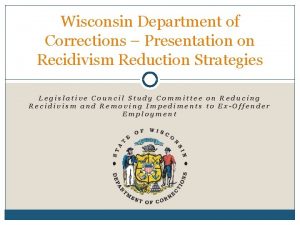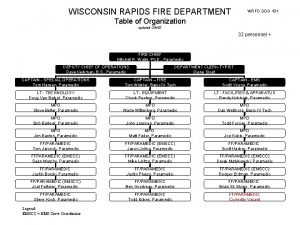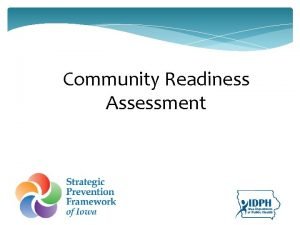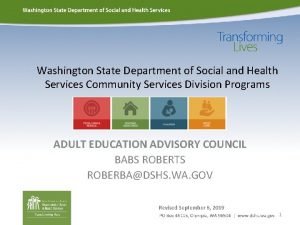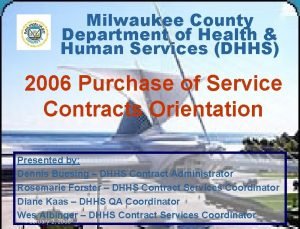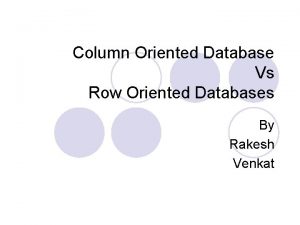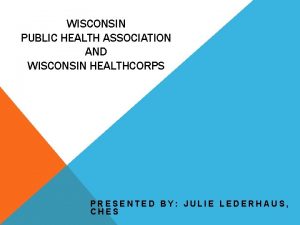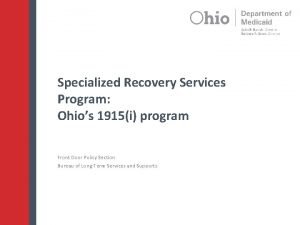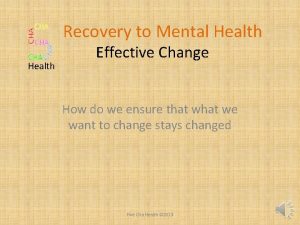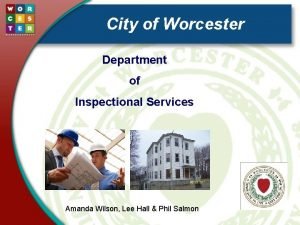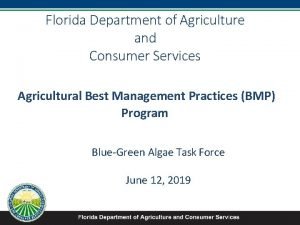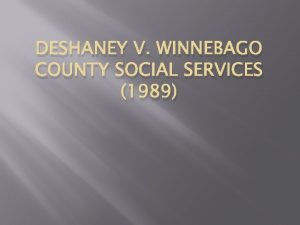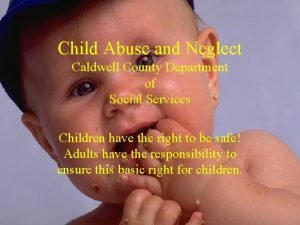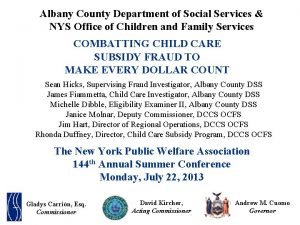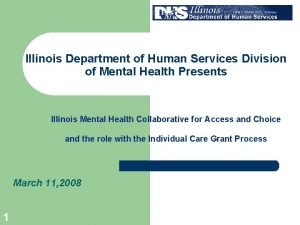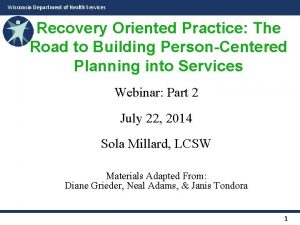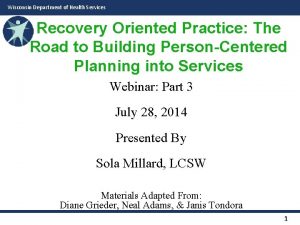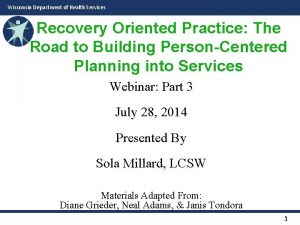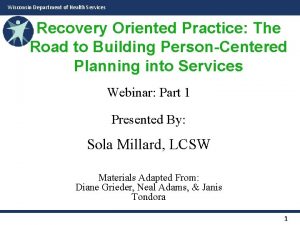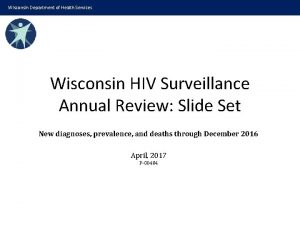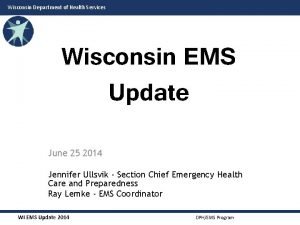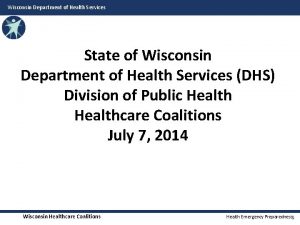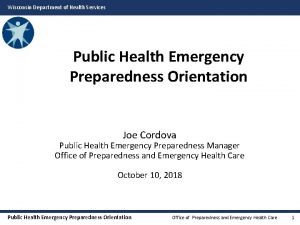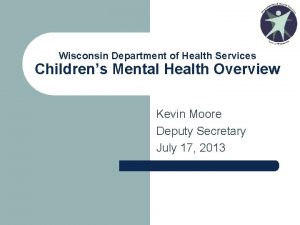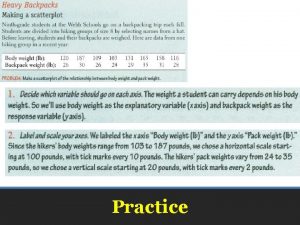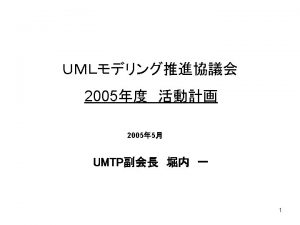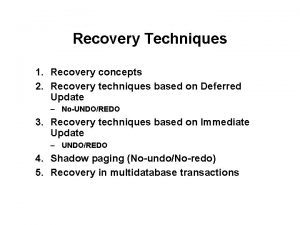Wisconsin Department of Health Services Recovery Oriented Practice







































- Slides: 39

Wisconsin Department of Health Services Recovery Oriented Practice: The Road to Building Person-Centered Planning into Services Webinar: Part 2 July 22, 2014 Sola Millard, LCSW Materials Adapted From: Diane Grieder, Neal Adams, & Janis Tondora 1

Wisconsin Department of Health Services Learning Objectives Be able to: • Describe what the fidelity to Person-Centered Planning looks like • Explain how to improve documentation • Describe the role of the county or tribe in ensuring quality services with contracted providers • Understand direct support staff’s role in psychosocial rehabilitation in Community Based Residential Facilities (CBRF) 2

Wisconsin Department of Health Services Check-In • Did you complete the PCP fidelity assignment? • Did you see documentation that could be improved? • Were there any areas of the PCP components that did not fit in with your organization’s documentation? 3

Wisconsin Department of Health Services PCP Components Outcomes ry ve co Re es oc Goals Prioritization Philosophy Adams & Grieder (2014) t en sm Assessment es Understanding s As Pr Strengths/Barriers an Pl s Services Objectives 4

Wisconsin Department of Health Services Assessment: Common Mistakes • Limited mention of the person’s strengths (e. g. , past success, interests, preferences) • Limited mention of the barriers that are getting in the way • Not sufficiently comprehensive • Does not use all available information and resources 5

Wisconsin Department of Health Services Clinical Summary: Common Mistakes • Lacks adequate integration and understanding of the person • Does not give both the provider’s and individual’s perspectives • Does not pull out key areas that need to be addressed • Unclear what the treatment recommendations are 6

Wisconsin Department of Health Services Goals: Common Mistakes • Not global • Not directed toward recovery • Not consistent with assessment and clinical summary • Too many • Not responsive to need 7

Wisconsin Department of Health Services Goals: Common Mistakes Example: “I want to go fishing more often. ” Is this a meaningful goal for this individual? Do you need to peel the onion? 8

Wisconsin Department of Health Services Goals: Use of OARS Conversation (OARS) o Open-ended questions: What would this mean to you to be able to go fishing? What’s getting in the way of doing this? o Affirmation: You really have tried hard to overcome the anxiety. o Reflections: Seeing your friends at the fishing spot is really important to you and you feel stuck because of your anxiety o Summary: From what you said, you really want to be able to see your friends again at the fishing spot. There are things you have tried to do to get a handle on the anxiety but there are things you have not tried yet. You want to feel unstuck so you can get out again. What are some of your ideas to get over this hump? How can we help? 9

Wisconsin Department of Health Services Goals & Clinical Summary Example: o “I want to go fishing more often to see friends. ” Clinical summary: Ed would like to be able to go fishing again so he can see his friends but has a significant amount of social anxiety. His increased anxiety has been a barrier for him to be able to go fishing and socialize with others outside the home. His mother passed away five months ago and his anxiety seems to have increased since then. 10

Wisconsin Department of Health Services Goals: Common Mistakes Examples: o I don’t want to go back to the hospital. o I don’t want to be overwhelmed anymore. Could these be reframed to move toward something desirable? Examples: o I want a cell phone. o I want a car. Are these life-changing, meaningful goals for the person? 11

Wisconsin Department of Health Services Goals: Common Mistakes Examples: o I don’t know what my goal is o I just want to be left alone o I want to maintain my routine How do you work through this? Use of motivational interviewing (e. g. pros/cons, working with ambivalence) 12

Wisconsin Department of Health Services Strengths and Barriers: Common Mistakes Strengths: Not enough strengths to barriers Barriers: Barriers that are not related to the person’s mental health and/or substance use disorder Ex: Does not like mowing the lawn 13

Wisconsin Department of Health Services Objectives: Common Mistakes • • • Does not support the goal Not measurable or behavioral More of an intervention than objective Not time framed Too many simultaneous objectives Uses AND, hard to measure 14

Wisconsin Department of Health Services Objectives: Common Mistakes Example (Use of AND): Mike will continue to clean his apartment and wash his dishes and clean along side staff once a week. Is this objective Behavioral, Achievable, Measurable, Time-framed? Are there mixed objectives and interventions? 15

Wisconsin Department of Health Services Objectives: Re-write Objective: o Within 3 months, Mike will spend 2 hrs/wk doing household chores as evidenced by self-report Intervention: o CBRF staff will prompt and train Mike in doing household chores 2 hrs/wk to improve Mike’s cleaning skills. 16

Wisconsin Department of Health Services: Common Mistakes o Combined activities a provider is doing o There is no connection to the assessment and clinical summary (Is the service needed by the person? ) o Frequency, intensity, and duration not included o Purpose not included o Does not reflect multidisciplinary activity o Does not include natural supports when they are available 17

Wisconsin Department of Health Services: Common Mistakes Example (combined activities): CBRF staff will assist Lee with meal planning/preparation, personal hygiene, shopping, and household cleaning. Name, Qualifications, Job Title, Modality, Frequency, Purpose 18

Wisconsin Department of Health Services Case Scenario 1 John: 45 yrs. old. Hx of schizoaffective disorder. John lives in a CBRF. Worked part-time two years ago but starting drinking more to manage his mood and was fired from his job in construction. John was hospitalized six months ago due to severe depression and hallucinations. He has been sober for the past four months. John is divorced, no children. John states, “I think I did better when I was working even though it was stressful. ” John admits that he doesn’t always remember to take his medication, some days has trouble getting out of bed, and does not know how to cook for himself. John’s mother lives nearby but they do not always get along. John states he would like to have his own apartment, a computer, drive again, and get a girlfriend. John likes to watch sports, use technology, and socialize. 19

Wisconsin Department of Health Services John’s Plan: Identify the Mistakes Goal: “I want a computer” Strengths: Motivated Barriers: Problems with managing money and self-care. John does not take his meds consistently, is easily stressed and disorganized. Objectives: -John will save money to get a computer -John will research what kind of computer he would purchase Services: -CBRF staff will teach John money management skills -CBRF staff will help John with cooking, shopping, medication management, and community recreation -Case manager will monitor John’s progress 20

Wisconsin Department of Health Services John’s Recovery Plan: Better Documentation Goal 1: “I want to get a job back in construction” Goal 2: “I want my own apartment” 21

Wisconsin Department of Health Services John’s Recovery Plan: Better Documentation Barriers: • Lacks skills in managing stress and mood • Vulnerability to relapse • Does not take his medication consistently • Lacks individual adult daily living skills • Does not take care of his personal hygiene 22

Wisconsin Department of Health Services John’s Recovery Plan: Better Documentation Strengths: • Motivated to make changes • Wants to maintain his abstinence from alcohol • Has work experience • Likes to socialize with others • Aware of stress affecting his mood 23

Wisconsin Department of Health Services John’s Recovery Plan: Better Documentation Goal 1: “I want to get a job back in construction” Objectives (short-term goals): • Within 2 months, John will complete a resume. • Within 3 months, John will apply to 3 jobs as evidenced by self-report 24

Wisconsin Department of Health Services John’s Recovery Plan: Better Documentation Goal 2: “I want my own apartment” Objectives (short-term goals): • Within 2 months, John will complete a WRAP plan • Within 3 months, John will prepare at minimum three meals per week • Within 3 months, John will ask CBRF staff for his medication 4 x/week without prompting • Within 6 months, John will get up in the morning independently 5 x/week • Within 6 months, John will use a stress management coping strategy 75% of the time when he is stressed 25

Wisconsin Department of Health Services John’s Recovery Plan: Better Documentation Goal: “I want to get a job back in construction” Services: • Sue Smith, BA, Employment Specialist, will assist John in finding a job by meeting with him 4 hrs/wk to assist with developing a resume, identifying available jobs, visiting possible job locations, and practicing interviewing • CBRF staff will remind John to attend to his personal hygiene, daily or as needed, so that John gets used to attending to his hygiene • CBRF staff will monitor John daily for symptoms and side effects when he takes his psychotropic medication, and will prompt John on days he does not ask for the medication • John will attend AA meetings 2 x/wk to maintain his recovery from alcohol Name, Qualifications, Job Title, Modality, Frequency, Purpose 26

Wisconsin Department of Health Services John’s Recovery Plan: Better Documentation Goal: “I want my own apartment” Services: • • • CBRF staff will assist John with emotional regulation skills 2 hrs/wk to better manage his mood and stress CBRF staff will prompt John to get up in the morning on days John does not get up on his own in order for John to have a consistent schedule CBRF staff will assist John with planning and preparing meals 4 hrs/wk in order to teach John cooking skills. Mike Jones, BA, case manager, will follow-up with John’s providers 4 hrs/mo to ensure John receives quality services Ann Moore, CPS, peer specialist, will assist John in developing a WRAP plan and identifying coping strategies 3 hrs/wk to help John manage his stress and mood. CBRF staff will monitor John daily for symptoms and side effects when he takes his psychotropic medication, and will prompt John on days he does not ask for the medication Name, Qualifications, Job Title, Modality, Frequency, Purpose 27

Wisconsin Department of Health Services Role of Counties and Tribes and Community Based Residential Facilities (CBRF) in Psychosocial Rehabilitation 28

Wisconsin Department of Health Services Psychosocial Rehabilitation: Counties’ and Tribes’ Responsibilities with Contracted Providers • Counties and Tribes are ultimately responsible for the work performed by contracted providers • Which means the Counties and Tribes are responsible for: o Training requirements o Outcomes and measurements o Communication with contracted providers o Documentation o Quality and frequency of services 29

Wisconsin Department of Health Services Psychosocial Rehabilitation: Case Manager’s Role Case manager is responsible for ensuring: • Recovery plan is cohesive and connects the plan to the functional screen, assessment and clinical summary, as well as to outcomes • Direct support staff’s documentation is linked to the plan • Services are being provided as listed in the plan • Expectations about services and outcomes are communicated to contracted providers 30

Wisconsin Department of Health Services Psychosocial Rehabilitation in a CBRF Who is most important to outcomes? Direct support staff Role: • Know the person • Understand what is important to the person • Understand the person’s communication style and non-verbal communication • Have a trusting relationship with the person • Support the person in different environments • Is the individual the person turns to for assistance and support Adapted from Person-Centered Planning: A Guide to Help Direct Support Professionals Understand Their Role in the Person Centered Planning Process 31

Wisconsin Department of Health Services Psychosocial Rehabilitation in a CBRF Direct support staffs’ job within CRS: • • Implementing the plan of service Need to be familiar with each person’s plan in the home Know what the individual’s goals and objectives are Know what the staff’s responsibilities are to assist the individual in achieving the goals • Work with the home manager and other staff to provide the psychosocial rehabilitation services as a team • Help people learn to care for themselves and their home Adapted from Person-Centered Planning: A Guide to Help Direct Support Professionals Understand Their Role in the Person 32 Centered Planning Process

Wisconsin Department of Health Services Psychosocial Rehabilitation in a CBRF Direct support staff’s role in pre-planning: • Communicates with the case manager the progress the person has made on their short-term and long-term goals and any barriers that have gotten in the way • Shares with other staff and with the case manager about the person’s preferences, favorite activities, dislikes, challenges, strengths, wants • The direct support staff could be asked by the person to join the recovery team Adapted from Person-Centered Planning: A Guide to Help Direct Support Professionals Understand Their Role in the Person Centered Planning Process 33

Wisconsin Department of Health Services Psychosocial Rehabilitation in a CBRF House Manager’s Role in Assessing Quality of Services: • Do my staff know each person’s hopes and dreams? • Do my staff know the goals in each person’s plan? • Have the residents made progress in reaching their short-term and long-term goals? • Do my staff do too much for residents? Do they show and teach residents how to do something for themselves? • Do my staff provide opportunities for residents to have choices? 34

Wisconsin Department of Health Services Further Learning for Next Week Ann: 60 yrs. old. Hx of schizophrenia. Never been married, no children. Ann lives in a CBRF. Ann has diabetes and high blood pressure. She has difficulty socializing with people but does see her sister occasionally and went to church. Ann had an incident (involving her psychosis) at church and is afraid to return. Ann likes to read, plant flowers, and watch movies. Ann says, “I want be able to keep my routine and go back to church. ” Ann’s Christian faith and reading the bible is very important to her. Ann used to buy random items that she did not need and would run out of money. Her sister is now her payee. Ann does state she would like to have control of her money again. Ann is able to cook for herself but has difficulty with hygiene and managing her money, as well as, remembering to take her medication and going to her doctor’s appointments. 35

Wisconsin Department of Health Services Further Learning for Next Week Create a recovery plan for Ann: Goals? Barriers? Strengths? Objectives? Services? 36

Wisconsin Department of Health Services Recovery Plan Worksheet Barriers: Strengths: Goal: Services: Objectives: 37

Wisconsin Department of Health Services References and Resources Person-Centered Planning: A Guide to Help Direct Support Professionals Understand Their Role in the Person Centered Planning Process http: //www. cmhcm. org/provider/centrain/Training_Units/P CP. pdf 38

Wisconsin Department of Health Services Contact Info Sola Millard, LCSW • In support of: Department of Health Services, Division of Mental Health and Substance Abuse Services • Phone: 608 -261 -6743 Sola. Millard@wisconsin. gov 1 W. Wilson St. , Room 951 P. O. Box 7851 Madison, WI 53707 -7851 39
 Wi estate recovery program
Wi estate recovery program Black widoc
Black widoc Wufar codes
Wufar codes Heather bruemmer wisconsin
Heather bruemmer wisconsin Wisconsin department
Wisconsin department Wisconsin department
Wisconsin department Wrfd fire department
Wrfd fire department Iowa department of health and human services
Iowa department of health and human services Washington state department of social and health services
Washington state department of social and health services Department of health and senior services missouri
Department of health and senior services missouri Milwaukee health and human services
Milwaukee health and human services Maine department of health and human services
Maine department of health and human services Sales promotion vehicles
Sales promotion vehicles Row oriented database
Row oriented database Recovery oriented systems of care
Recovery oriented systems of care Louisiana department of health and hospitals licensing
Louisiana department of health and hospitals licensing Wisconsin public health association
Wisconsin public health association Wisconsin public health association
Wisconsin public health association Wisconsin health corps
Wisconsin health corps Connection-oriented and connectionless services
Connection-oriented and connectionless services Mobile station (ms)
Mobile station (ms) Full cost recovery
Full cost recovery Specialized recovery services
Specialized recovery services Mail recovery services
Mail recovery services Mainframe disaster recovery services
Mainframe disaster recovery services Cost recovery support services
Cost recovery support services Ahrr example
Ahrr example Recovery college lincolnshire
Recovery college lincolnshire Steps to mental health recovery
Steps to mental health recovery Yale program for recovery and community health
Yale program for recovery and community health Building department worcester ma
Building department worcester ma Juvenile assessment center miami
Juvenile assessment center miami Department of agriculture consumer services
Department of agriculture consumer services Deshaney v. winnebago county department of social services
Deshaney v. winnebago county department of social services Caldwell county child protective services
Caldwell county child protective services Albany county dss
Albany county dss Seattle human services department
Seattle human services department Bidsync through miamidade county
Bidsync through miamidade county Illinois department of human services
Illinois department of human services Department of correctional services strategic plan
Department of correctional services strategic plan

